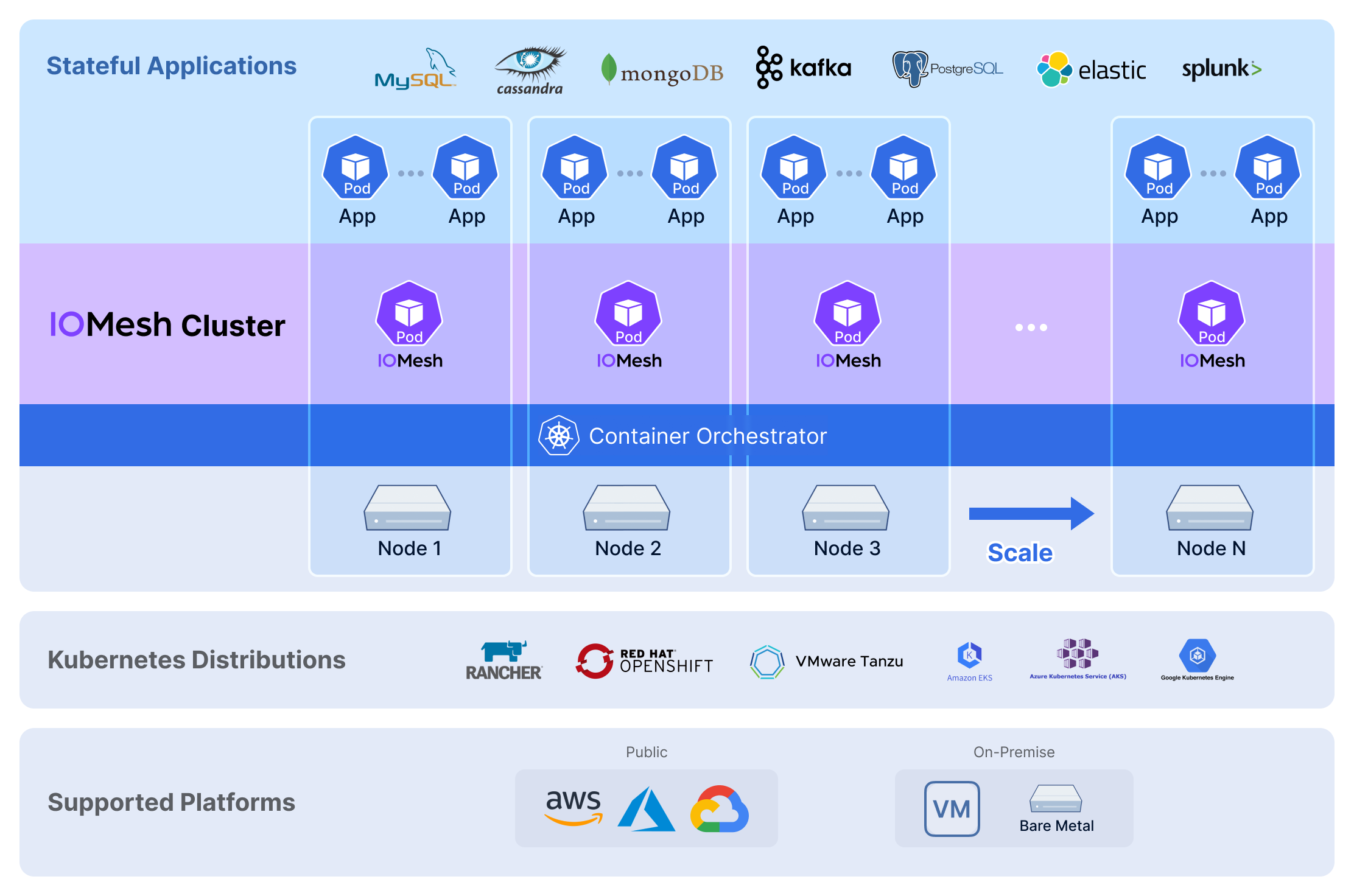Introducing IOMesh 1.0, the Enterprise Kubernetes-Native Storage for Stateful Applications
Today IOMesh announces the release of IOMesh 1.0, the enterprise Kubernetes-native distributed storage to help customers build elastic, reliable, and highly performant storage resource pools for stateful applications, in a Kubernetes-native way.
IOMesh was first announced in 2021 as a preview version, with tested performance surpassing Portworx and other peer products. IOMesh is included in the “cloud-native storage” of CNCF Cloud Native Landscape and has achieved Red Hat OpenShift certification as well as compatibility certification with the Alauda Container Platform. IOMesh has been deployed by Alibaba Cloud and other customers to support data services applications.
IOMesh 1.0 is the first commercial edition, with improved functionalities in installation, deployment, storage, operations & maintenance, etc. The community edition is also available for a quick experience of the full range of features for free.
Watch IOMesh introduction and demo videos now.
Why IOMesh?
Compared with other storage solutions, IOMesh demonstrates unique advantages below.
Reduce the cost and complexity of adopting persistent storage
Leverage the hardware resources of Kubernetes Worker nodes for converged deployments, saving hardware costs and rack space, and reducing deployment challenges. The Kubernetes native operation and tools can also further reduce the costs of learning for operations teams.
Support stateful application in production
With enterprise-grade high availability features, high performance, and low latency, it can better support stateful applications to boost business efficiency.
More elasticity and flexibility
Start small with on-demand investment as your business grows. 10 minutes to deploy and bring storage services online, with scaling in minutes for more agile business processes.
No compatibility issues
No kernel dependencies and no need to consider kernel versions when installing and deploying. Deployable in CNCF-certified Kubernetes clusters.
Product Architecture
Deployed alongside compute workloads, IOMesh reduces infrastructure space usage and simplifies operations. Its distributed architecture further eliminates traditional controller bottlenecks to fully leverage the performance of new storage media, improving system concurrency and scalability.

Features
High Performance
I/O localization. Minimize cross-node data reads by storing a data replica on the local node and limiting read I/O operations to this node when possible, resulting in reduced network traffic and higher application performance.
Cold & hot data tiering. Leverage the capacity and performance of various types of storage media, while maintaining a balance between cost and performance.
All-flash configuration. Reduce latency and I/O variability, resulting in faster and more consistent application performance.
Local PV. Create local PVs with block devices, providing better I/O performance than Kubernetes local PVs limited to directories.
Production-Ready High Availability & Security
Multiple replica policy. Ensure data high availability by intelligently placing replicas between nodes based on local priority, optimal placement, and capacity balancing principles.
PV snapshot. Take a snapshot of a volume in seconds to save and use historical data at any time.
Abnormal disk detection & isolation. Automatically detect and isolate abnormal disks to reduce impact on system performance and operational burden.
Secure access. Encrypt a PV using a StorageClass configured with Kubernetes Secret. Only users with the appropriate credentials can access the PV.
Intelligent data recovery. Adaptively adjust data recovery or migration speed based on business loads to ensure business I/O.
Fully Integrated into Kubernetes Ecosystem
CSI PV provisioning. Dynamically provision storage with PVC and StorageClass, providing local or distributed storage volumes.
O&M with K8s Operator. Accelerate deployment and scaling with Helm Chart and declarative API management capabilities.
Integrated into K8s toolchain. Integrated into Prometheus and Grafana to provide standardized, visualized monitoring and alerting service.
Elastic & Agile
Start small. Begin with just 3 nodes and invest according to your actual business needs to save costs.
Fast deployment & scaling. Leveraging cloud-native capabilities, deployment can be completed within 10 minutes, and scaling in minutes.
Open & Inclusive
No kernel dependencies. IOMesh operates in user space instead of kernel space, making kernel compatibility a non-issue for installation, deployment, and upgrade.
Widely compatible. Deployable in most CNCF-certified Kubernetes clusters.
Use Cases
IOMesh can help customers achieve cloud-native acceleration in multiple use cases.
Containers as a Service
Speed up your application development and delivery in container environments.
Database as a Service
Ensure node-level high availability with minimal or no downtime.
KubeVirt
Provide persistent storage to Virtual Machines running in Kubernetes Pods.
Install IOMesh with 1 Line of Code
Install IOMesh Community Edition with a single line of code, and receive a free 30-day trial license upon installation. You can also later request a permanent free license. Note that this installation requires an Intel x86_64 or a Kunpeng AArch64 Kubernetes cluster. For further information on the Enterprise Edition, please refer to IOMesh Docs.
export IOMESH_DATA_CIDR=10.234.1.0/24; curl -sSL https://iomesh.run/install_iomesh.sh | sh -
Join the IOMesh community on Slack for more updates and community support.